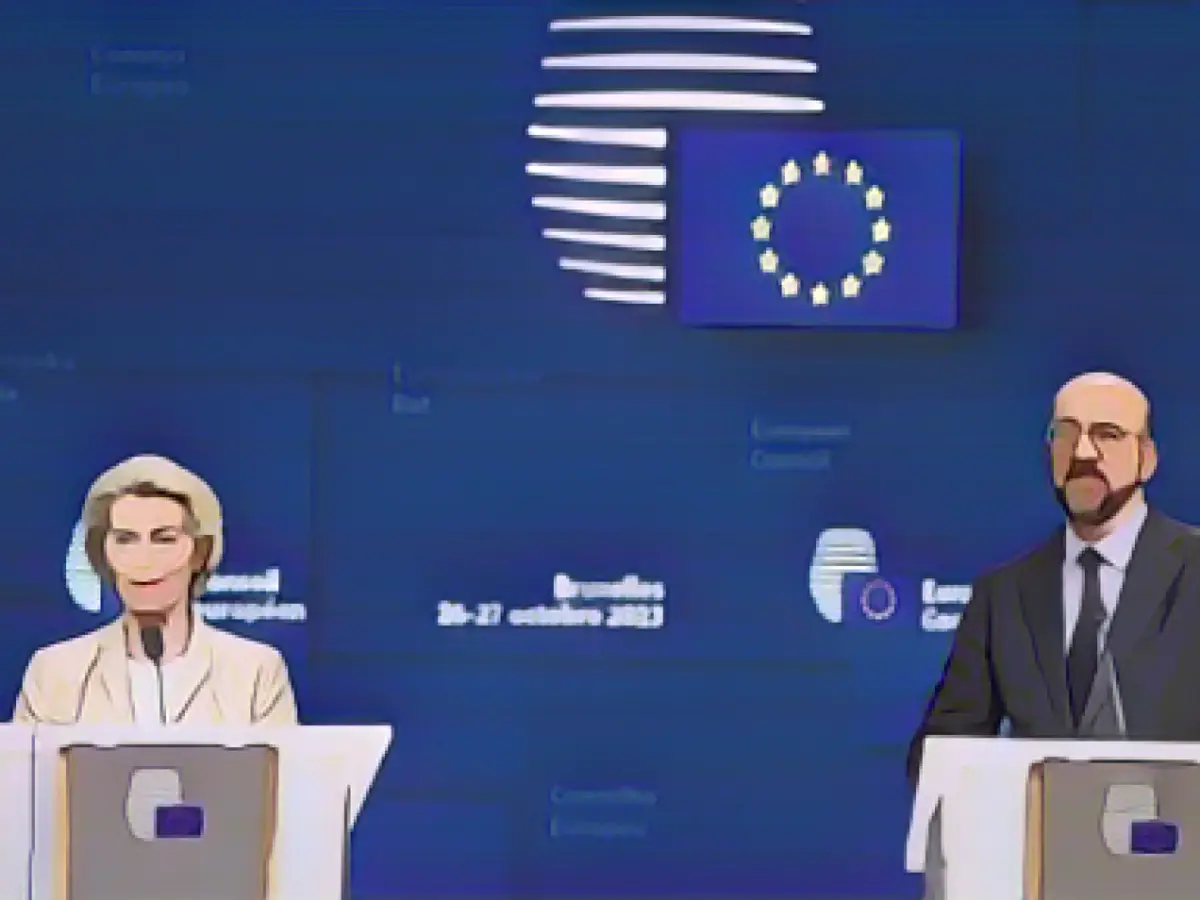Title: EU Leaders Dive into Intense Discussions with Xi Jinping in Beijing
With a jam-packed schedule, EU leaders arrive in Beijing for a series of meetings, starting with a working lunch with Xi Jinping, followed by interactions with China's Prime Minister Li Qiang, an evening dinner, and a concluding press conference. The talks will span a variety of topics, including climate change, healthcare, and contentious issues like trade disputes.
Von der Leyen had previously urged China to find common ground on trade disagreements, expressing the EU's unwillingness to endure prolonged trade imbalances. However, Beijing voiced concern over the EU's limitations on exporting sensitive technology.
Over and above trade, pressing matters, such as the Russian conflict against Ukraine and Middle Eastern turmoil, will be on the agenda. The EU also plans to address Beijing's sanctions imposed on European politicians, including the restriction of Reinhard Bütikofer, a prominent Green Party figure from Germany.
Relevant Insights:
Recent tensions between the EU and China have centered around trade discrepancies, intellectual property practices, and China's military support for Russia in Ukraine.
- The EU introduced provisional tariffs on Chinese electric vehicles, prompting China to retaliate with probes into EU pork exports and dairy subsidies.
- The EU has brought a WTO case against China over its intellectual property practices, alleging that Beijing sets global royalty rates for EU standard essential patents without consulting patent owners.
- The EU has ramped up scrutiny of Shein and Temu, demanding internal documents and risk mitigation, as part of its Digital Services Act (DSA) crackdown on economical e-commerce imports from China.
Despite these difficulties, the opportunity for collaboration in innovative sectors such as green transformation, the digital economy, artificial intelligence, and new energy industries exists. China and the EU have underscored the significance of mutual trust and dialogue in navigating their complex partnership.
[1] [2]
Enrichment Data:
The ongoing trade disagreements and areas of potential collaboration between the EU and China, specifically focusing on tariffs, intellectual property, and digital services, can be outlined as follows:
Trade Disputes
- Intellectual Property Disputes:
- Standard Essential Patents (SEPs): The EU has demanded consultations with the WTO to address China's practice of setting global royalty rates for SEPs without the patent holders' consent. This act is considered unfair and illegal, as it pressures European companies to offer Chinese manufacturers affordable access to European technology, thereby undermining the EU's high-tech sectors[1][4].
- Anti-Suit Injunctions: The EU is also contesting China's anti-suit injunctions, which restrict high-tech patent holders by imposing penalties or sanctions if they seek to enforce their intellectual property rights through non-Chinese courts[1].
- Tariffs and Trade Practices:
- The EU has objected to Chinese anti-dumping measures on brandy in the past and is currently examining cheap Chinese imports, including those from e-commerce platforms like Shein and Temu, due to concerns over consumer safety and data privacy[5].
Potential Areas of Cooperation
- Digital Services and Connectivity:
- The EU is advancing digital connectivity in Central Asia through the Team Europe Initiative on Digital Connectivity, which aims to create high-capacity internet networks and elevate international bandwidth access. This initiative supports sustainable and inclusive satellite connectivity, as well as sectors like telecoms reform, cybersecurity, and personal data protection[2].
- Intellectual Property and Innovation:
- Cooperative efforts are needed to confront Chinese theft of intellectual property. The EU, US, and UK can strengthen their standing by sharing information and analysis on China's threats to intellectual property and collaborating to fortify intellectual property regimes in countries like Mexico, Vietnam, Indonesia, and India[3].
- Transatlantic Cooperation on China Policy:
- The EU and US are investigating ways to harmonize standards based on international standards for emerging technologies like AI and industrial products. They should also align on technical standards such as cybersecurity certification to facilitate transatlantic digital trade[3].
- Regulatory Oversight and Data Privacy:
- The EU is tightening oversight on Chinese firms, particularly in the digital services sector. For example, Italy has prohibited a Chinese AI firm, DeepSeek, due to data privacy concerns and non-compliance with European regulations[5].
- Strategic Autonomy and Economic Interests:
- The EU is balancing strategic autonomy with economic interests, emphasizing the need to engage with China while strengthening collaboration with the US on economic security. This pragmatic approach aims to reconcile differing views and cultivate partnerships in sectors like agriculture, aviation, AI, energy, and finance[5].
In summary, the EU and China are embroiled in trade disputes related to intellectual property and tariffs, while there are also potential areas of cooperation in digital services, innovation, and regulatory oversight.








